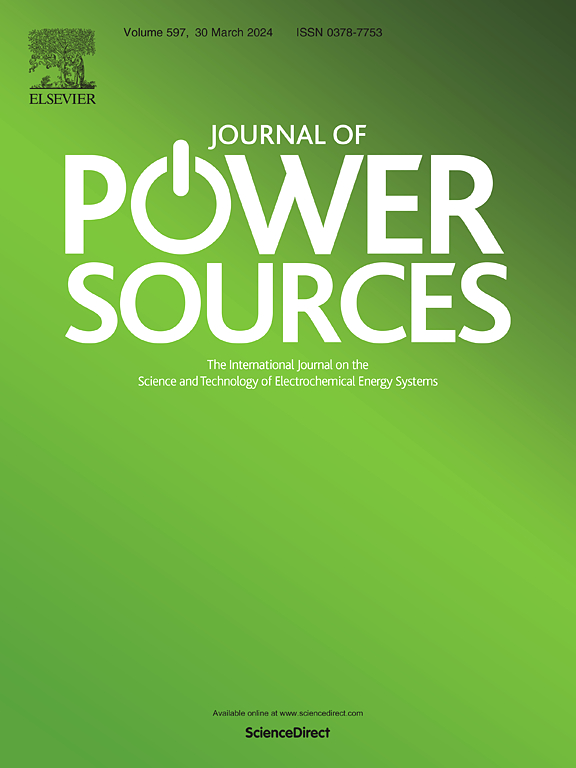基于有限元模型和数据驱动聚变的极快充电袋式锂离子电池温度估算
IF 7.9
2区 工程技术
Q1 CHEMISTRY, PHYSICAL
引用次数: 0
摘要
为了解决电动汽车的里程焦虑问题,极快充电技术已经成为主流解决方案。然而,极快充电容易导致电池内部热量积聚,导致电池温度快速上升和热失控。因此,在快速充电的情况下,准确的温度估计是至关重要的。为了解决电热耦合模型计算效率低下的问题,开发了一种集成三维(3D)热建模和数据驱动方法的电池组热替代模型。该模型提高了计算效率,同时确保电池温度预测保持在合理的误差范围内。开发了基于电池的3D热电池组模型,并通过计算模拟生成了训练数据。在不同环境温度、充电速率、初始充电状态(SOC)和温度条件下的多条件充电数据集上,对基于LSTM的自注意代理模型进行了训练。获得了高精度的数据驱动的电池组热替代模型,并通过与三维热模型的对比验证了其准确性。结果表明,模型和数据驱动的温度估计平均误差为1.66℃,平均相对误差为3.84%。本文章由计算机程序翻译,如有差异,请以英文原文为准。
Temperature estimation of extreme-fast -charging pouch lithium-ion cell based on finite element model and data-driven fusion
To address the issue of range anxiety in electric vehicles, extreme-fast-charging technology has emerged as a mainstream solution. However, extreme-fast-charging can easily lead to heat accumulation in batteries, inducing rapid temperature rise and thermal runaway. Accurate temperature estimation in fast-charging scenarios is therefore critical. To address computational inefficiencies in electrothermal coupling models, a battery pack thermal surrogate model integrating three-dimensional(3D) thermal modeling and data-driven methods has been developed. This model improves computational efficiency while ensuring that battery temperature predictions remain within reasonable error margins. A cell-based 3D thermal battery pack model has been developed, with training data generated through computational simulations. The long short-term memory (LSTM)-based surrogate model with self-attention mechanisms has been trained on multi-condition charging datasets under different ambient temperatures, charging rates, initial state of charge (SOC), and temperatures. A highly accurate data-driven thermal surrogate model for the battery pack is obtained, and its accuracy is validated through comparison with the 3D thermal model. The results show that the model and data-driven temperature estimation achieves an average error of 1.66 °C and an average relative error of 3.84 %.
求助全文
通过发布文献求助,成功后即可免费获取论文全文。
去求助
来源期刊

Journal of Power Sources
工程技术-电化学
CiteScore
16.40
自引率
6.50%
发文量
1249
审稿时长
36 days
期刊介绍:
The Journal of Power Sources is a publication catering to researchers and technologists interested in various aspects of the science, technology, and applications of electrochemical power sources. It covers original research and reviews on primary and secondary batteries, fuel cells, supercapacitors, and photo-electrochemical cells.
Topics considered include the research, development and applications of nanomaterials and novel componentry for these devices. Examples of applications of these electrochemical power sources include:
• Portable electronics
• Electric and Hybrid Electric Vehicles
• Uninterruptible Power Supply (UPS) systems
• Storage of renewable energy
• Satellites and deep space probes
• Boats and ships, drones and aircrafts
• Wearable energy storage systems
 求助内容:
求助内容: 应助结果提醒方式:
应助结果提醒方式:


